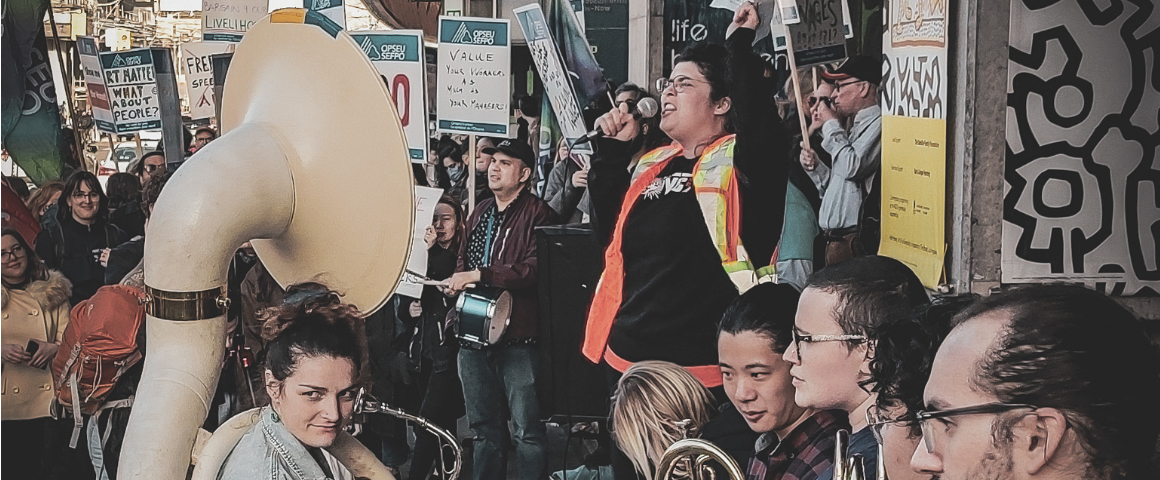PV Ontario Bureau
Arts workers at the Art Gallery of Ontario (AGO) have been on strike since March 26. Ontario Public Service Employees Union (OPSEU) Local 535 is fighting for decent wages and against part-time precarious work and contracting out. At the same time, the AGO has prioritized executive salaries and extensive renovations to Ontario’s largest gallery.
Local 535 is made up of 400 arts workers doing a variety of work including assistant curators, food and hospitality staff, researchers, technicians, carpenters, electricians, instructors, designers and visitor services staff. They make up the core workforce of the institution and the gallery has been unable to open since the strike began.
Meagan Christou, a bargaining committee member and secretary of OPSEU’s Provincial Young Workers Committee (PYC), told People’s Voice that the major outstanding issues were about pay and the fact that a large portion of the bargaining unit is made up of precarious part-time workers. “We need more wages and the contracting clause fixed. We want language that says look in house rather than out, and [provide] minimum shift hours,” Christou said.
AGO workers’ wages have been suppressed, along with a million other workers in Ontario’s broader public sector, through Doug Ford’s infamous Bill 124 passed in 2019. While the courts have now overturned this illegal piece of legislation, it effectively cut wages by imposing a 1 percent cap on all wages and benefits throughout the broader public sector. The closure of the gallery during the pandemic also hurt workers. However, during this same period the AGO Foundation paid its CEO Stephan Jost over $390,000 in consulting fees between 2020 and 2021 alone – on top of his $406,000 salary.
A full 60 percent of Local 535 is made up of part-time workers who make an average of $34,380 a year in one of Canada’s most expensive cities. The union has pointed out that “part-time workers still pay full-time rent.” The fight against underemployment and job security is a major driver of the strike among these workers, with the main demand being against the contracting out of work that AGO’s current workforce could do.
While the AGO is a major public institution responsible for over 22 percent of cultural public property in Ontario, it is also suffering from underfunding and privatization. The result has been more pressure on workers’ wages and working conditions, as well as increased reliance on private donors. OPSEU president JP Hornick has said, “Many of these workers are artists in their own right that contribute to the cultural fabric of the city. Devaluing artists is not how we show the public that the arts matter – the AGO is sending the message that as a prominent cultural institution, it prioritizes the bottom line over peoples’ livelihood.”
“It’s similar to underfunding in the post-secondary sector,” says Christou. “The Ministry of Heritage, Sport, Tourism and Culture Industries is supposed to oversee us, and they could tell the employer to get back to the table and that funding should be given to those who do the work. It’s the first strike in AGO history and workers are learning strategies and tactics as we go.”
The strike has received support from several other public sector unions including teachers with OSSTF and ETFO, CUPE, the Toronto and York Region Labour Council and the Ontario Federation of Labour. Christou says this support is welcome and important. “This strike will have long-term implications for our members’ living standards and for our union organizationally and we need solidarity.”
Local 535 is asking for picket line support as well as for people to email or call Stephan Jost, the AGO’s overpaid CEO, to demand decent wages and work. Jost can be reached at Stephan.jost@ago.ca and (416) 979-6660, extension 6501.
Support socialist media!
If you found this article useful, please consider donating to People’s Voice or purchasing a subscription so that you get every issue of Canada’s leading socialist publication delivered to your door or inbox!
For over 100 years, we have been 100% reader-supported, with no corporate or government funding.




